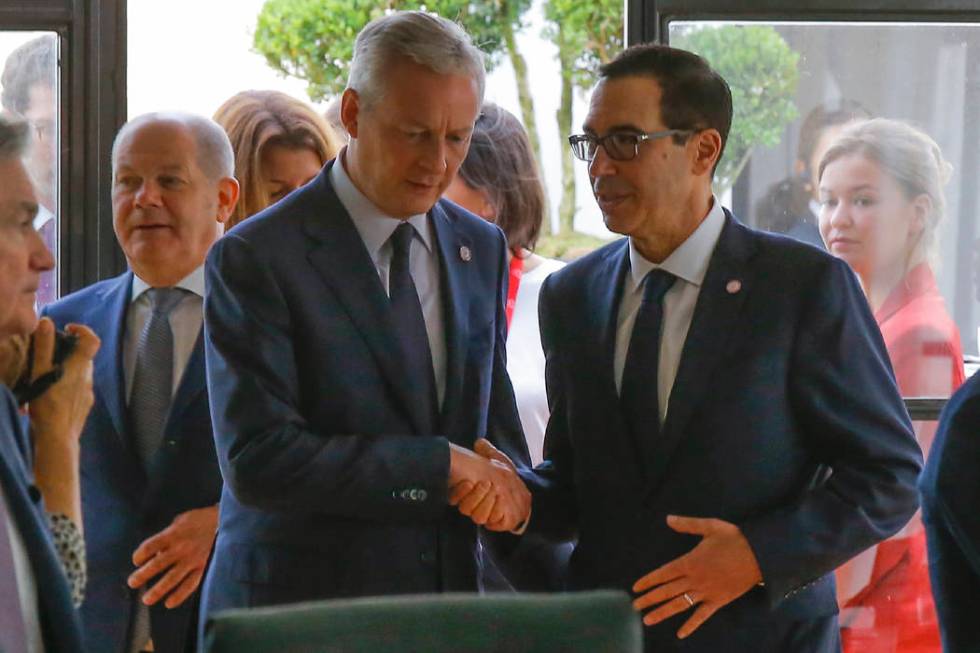G-7 finance chiefs issue stark warning about Facebook’s Libra

CHANTILLY, France — Finance chiefs from the Group of Seven rich democracies issued a stark warning on Thursday that cryptocurrencies like Facebook’s Libra should not be allowed before “serious regulatory and systemic concerns” are put in check.
France, which this year chairs the G-7 gatherings on topics ranging from the economy to security, said it is worried that what some call the “future of money” — encrypted digital currency — could spiral out of control.
France’s concluding summary from this week’s meeting said that the finance officials agreed that while cryptocurrencies could help make payments cheaper and more efficient around the world, they could also be used for money laundering and terrorism financing and could even endanger the stability of global currencies.
Host French Finance Minister Bruno Le Maire likened the creation of Libra to the development of a whole new state.
“We won’t allow private states to emerge that would have the same privileges of a state but without the controls that go with it,” Le Maire told reporters after the meeting in Chantilly, near Paris.
Facebook has proposed pegging Libra to existing currencies to make it more stable than the likes of Bitcoin and useable as a way to pay for things. Governments around the world are rushing to assess how that would affect or destabilize the economy — if, for instance, the cryptocurrency decides to weigh in favor of the dollar or the euro.
The officials agreed that cryptocurrencies like Libra will have to meet “the highest standards” of financial regulation before they can be implemented.
Need for faster money transfers
The statement conceded that there is a need for faster and cheaper international money transfers, and that governments could accelerate “ongoing public and private efforts to upgrade existing payment systems.”
Some, including Germany’s Central Bank President Jens Weidmann, even expressed cautious optimism about digital currencies.
“(It) could be quite attractive for consumers if they keep to what they have promised,” Weidmann told news agency DPA.
Libra has come in for a lot of criticism this week, with U.S. lawmakers this week saying they cannot trust Facebook with a big project like Libra after recent data privacy scandals.
While the officials appeared to be largely on the same page on Libra, they diverged on other topics, such as how to tax companies that do digital business in a country but have no physical presence there.
The U.S. and France in particular are at odds on the issue after Paris said it would put a pioneering 3% tax on tech giants like Facebook and Google.
France’s tech tax, which will soon be signed into law, has provoked a strong rebuke from the White House, which said it could lead to U.S. tariffs on French imports. The French said it will be withdrawn only if a global deal is forged, a diplomatic gamble that aims to obtain leverage with the U.S.
Mnuchin onjects to tech tax
On the orders of U.S. President Donald Trump, Treasury Secretary Steven Mnuchin objected robustly to the plan when he met with Le Maire in Chantilly.
The talks in Chantilly, however, yielded only vague promises.
The G-7 summary said that the countries aim to sketch out the outlines of a global agreement on taxing digital business by next January, and to create an arbitration forum.
Le Maire said the French tech tax will not be withdrawn in the immediate future, and Mnuchin said Trump will continue the investigation into the French.
“The president has instructed us to start a 301 investigation,” Mnuchin said after the meeting, referring to the section of the U.S. Trade Act that allows the U.S. president to retaliate in some cases against a foreign country over trade. It’s the same provision the Trump administration used last year to probe China’s technology policies, leading to tariffs on $250 billion worth of Chinese imports.
Le Maire said the current agreement needed to result in a final decision before France could withdraw its tax.
Yet he remained upbeat, maintaining that the process was moving “in the right direction,” and that the main goal of the G-7’s European members of France, Britain, Germany and Italy had been achieved: For the U.S. to accept language that new tax rules need developing for “highly digitalized business models.”
The G-7 finance meeting, which also includes Canada and Japan, will set the stage for a summit of the countries’ heads of state and government in August.
———
David McHugh in Frankfurt, Germany, contributed to this report.